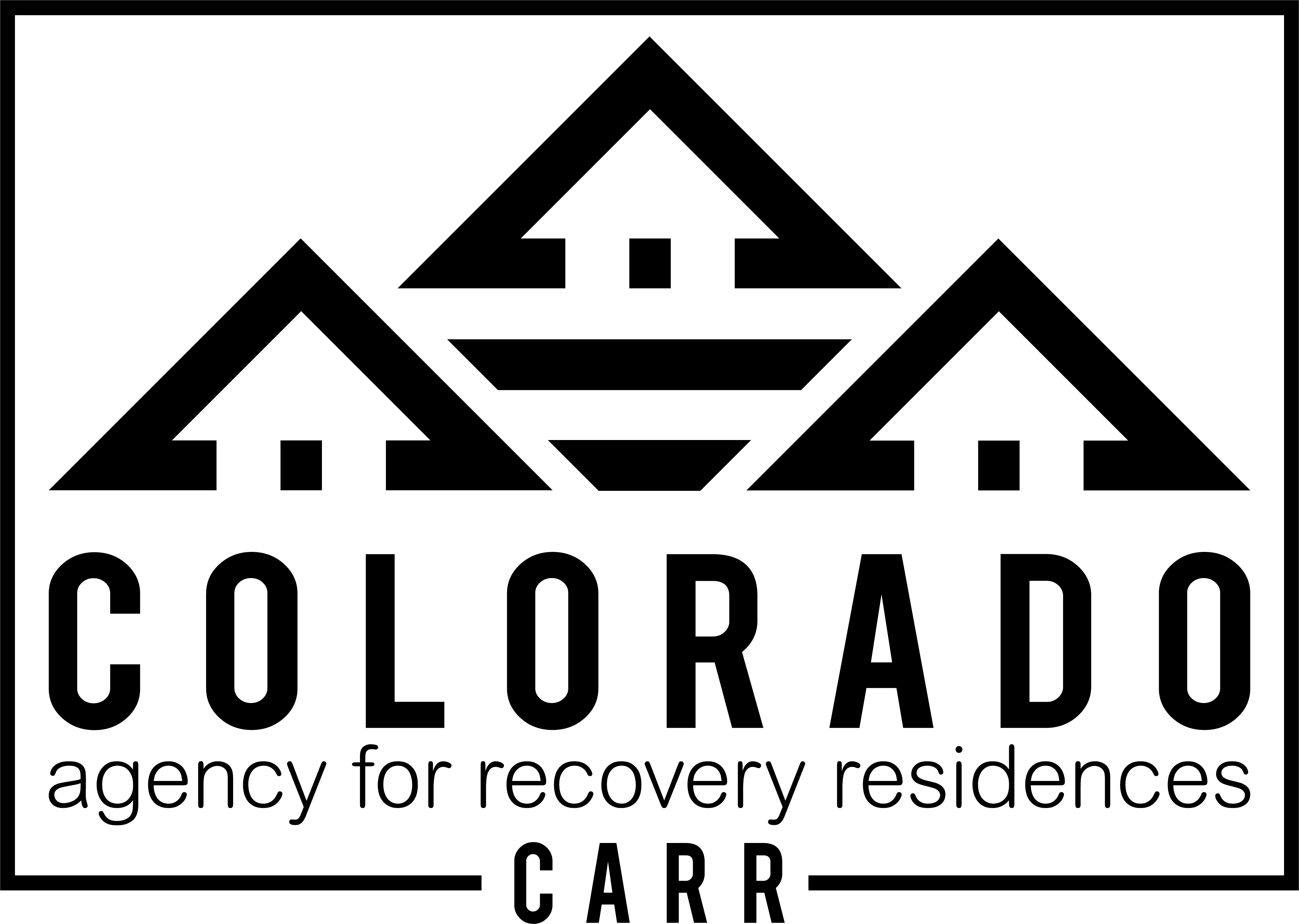
CARR Certification
The Colorado Agency for Recovery Residences (CARR) has been approved as the certifying body for recovery residences in Colorado. Pursuant to 27-80-129, recovery residences are required to obtain a certification from CARR in order to operate in Colorado and receive referrals from health care providers or health care facilities for individuals in need of recovery support services. As the approved certifying body, CARR will ensure that any premises, place, facility, or building they certify as a recovery residence meets the minimum standards to operate a recovery residence in Colorado. CARR will ensure recovery residences provide safe and healthy housing environments that support individuals in achieving and sustaining substance use disorder recovery.
You can access the digital forms needed to join CARR below.
CARR Forms
This packet includes CARR Assurances, CARR Code of Ethics, CARR levels summary and CARR Inspection Requirements.
CARR Forms
If you just need a specific form, rather than the whole packet, please download it below.
Certified Recovery Residence
The Colorado Agency for Recovery Residences (CARR) has been approved as the certifying body for recovery residences in Colorado. Pursuant to 25-1.5-108.5, C.R.S. (HB 19-1009), recovery residences are required to obtain a certification from CARR in order to operate in Colorado and receive referrals from health care providers or health care facilities for individuals in need of recovery support services. As the approved certifying body, CARR will ensure that any premises, place, facility, or building they certify as a recovery residence meets the minimum standards to operate a recovery residence in Colorado. CARR will ensure recovery residences provide safe and healthy housing environments that support individuals in achieving and sustaining substance use disorder recovery.
Become a Colorado Certified Recovery Residence
Submission of online application for each location of said program(s) shall be completed online. ALL fees and required documentation must be submitted and paid prior to inspections. CARR will email an invoice for fees once all applications documentation and an inspection date have been set.
To become a CARR Colorado Certified Recovery Residence, you must adhere to specific standards, ethics, and rules.
Before starting the recovery residence certification process, please have the following documents completed, and review the “Level of Recovery Residence“ your organization is operating. The below documents will need to be submitted during the application process:
- Mission and Vision Statement
- Colorado Certificate of Good Standing
- Liability Insurance
- Property Owner Permission
- Good Neighbor Policy
- Statement of Non-Discriminatory Practices
- Marketing Materials
- Medication Protocol
- Resident’s Rights
- Financial Obligations
- Services Provided
- Recovery Goals
- Client Expectations
- Client/Resident Privacy Policy
- Client/Resident Relapse Policy
- Emergency Escape Policy
- Discharge Policy
- House Manager Duties/Obligations
- Staff Policy and Procedures
- Staff client financial affairs with resident’s policy
- Code of Ethics signed by staff
- Policy on payment agreements, record system, and documentation
- Client refund policy with space for client’s signatures
- Policy on client feedback/grievance policy
- Peer interactions, recovery interactions, community recovery as part of the approach
- Staff training
- Rodent and Bug infestation Policy and Procedure
- Policy on sexual misconduct, sexual relations, or abuse of staff and residents
- Staff credentials (Levels 3+ only)
Signed documents must be emailed to: info@carrcolorado.org
Certification and designation revocation, denial, suspension, limitation or modification.
1. At CARR’s discretion, a certification or designation may be revoked, denied, suspended, modified, or have limited certification or designation. Written notification of the basis for action shall be sent by certified mail to the last known address of the agency and is effective ten (10) days from the date the letter was mailed. If the affected agency disagrees with the decision, it may appeal per Section 21.105 or other judicial reviewing body as may be determined by the court.
2. A certification or designation may be summarily suspended pending proceedings for suspension or revocation in cases of a deliberate or willful violation of applicable statutes and regulations or where the public health, safety, or welfare requires emergency action.
3. A certification or designation may be revoked, denied, suspended, modified, or limited for reasons including, but not limited to, the following:
- Non-compliance with these rules, applicable federal and state laws and regulations, or certification requirements.
- Negligence resulting in risk to individuals, staff, public health, or safety;
- Knowingly using or disseminating misleading, deceptive, or false information about other agencies, including, but not limited to, advertising;
- Exercising undue influence on or otherwise exploiting individuals to obtain or sell services, goods, property, or drugs for financial or personal gain;
- Accepting commissions, rebates, or other forms of remuneration for referring persons to or by the certified or designated agency;
- Evidence of agency fraud or misrepresentation;
- Failure to provide persons with information required by these rules and applicable state and federal statutes, rules, and regulations;
- Failure to submit required data in an accurate and timely manner to CARR or its authorized representatives;
- Withholding access to clinical, staff, or fiscal records, or administrative information when requested by CARR;
- Sale, use, or distribution of alcohol or illicit drugs, or unauthorized sale or distribution of prescription or over-the-counter drugs on recovery residence premises or during recovery residence activities off-premises;
- Knowingly using and/or disseminating false information about these rules, CARR rules, and state or federal regulations, or other information essential to interpreting or managing an individual’s status, case management, or interagency coordination.
- Commits a fraudulent insurance act as defined in Section 10-1-128, C.R.S.
- Failure to comply with a written plan of action.
4. Denial: Denial of Certification will occur when, during the Recovery Residence inspection process, evidence exists that the program exhibits substantial deficiencies that do not adhere to the CARR standard and prevent compliance. Recovery Residence will be given a written document within thirty (30) days following inspection with all inspections and changes necessary to follow compliance and guidelines of CARR.
5. Modification Process for Certification: Modifications to the certifications process are subject to change. Modifications and alterations will be updated and posted to the CARR website sixty (60) days prior to implementation.

